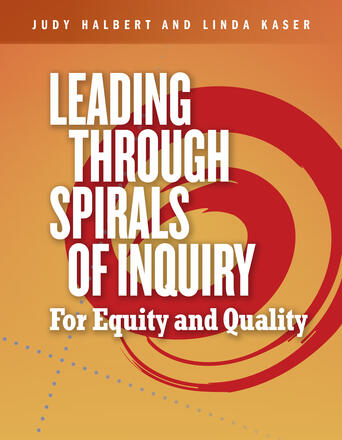 Leading Through Spirals of Inquiry For Equity and Quality
Leading Through Spirals of Inquiry For Equity and Quality
by Judy Halbert and Linda Kaser
Portage & Main Press, 2022
ISBN 9781774920206
$31.00, 224 pages
portageandmainpress.com
As educators across the country attempt to “get back to normal,” the realization surfaces that one particular norm doesn’t exist. This realization includes the understanding that innovative learning environments are needed to re-engage learners in a way that both honours and acknowledges student voice. For educators, districts, and leaders interested in this pursuit, Leading through Spirals of Inquiry provides the framework.
Judy Halbert and Linda Kaser have spent their careers in education, dedicated to achieving equity and quality for all learners. They have worked as teachers, principals, and advisors with British Columbia’s Ministry of Education and currently lead the Transformative Educational Leadership Program at the University of British Columbia. Additionally, Halbert and Kaser are co-directors of the Networks of Inquiry and Indigenous Education (NOIIE) and have been recognized for this work across British Columbia.
This resource is organized into nine chapters designed to engage and support inquiry networks with Halbert and Kaser’s Spiral of Inquiry action research process. The authors begin with a brief introduction, outlining the foundational ideas and stages within the spiral. This overview is followed by chapters devoted to each specific stage, in which the authors continue by breaking down the process with both comprehensive explanations and practical examples. Each chapter concludes by summarizing the main ideas, highlighting frequently asked questions, and offering conversation starters for inquiry groups working through the process.
Halbert and Kaser propose the Spiral of Inquiry as an alternative approach to professional development, collaboration, and relationship building. They believe that the spiral allows for inquiry with no one beginning or end, but rather a never-ending process of curiosity and growth. Process is valued over product, and learners are valued, recognized, and respected as the source of all knowledge in relation to change. Informed by the First Peoples Principles of Learning, the Spiral of Inquiry asks educational networks to consider timely and socially relevant questions which consider much more than standardized results and provincial scores.
The first few stages within the spiral focus on digging underneath current data sources (i.e., standardized tests) to unearth, through observation and conversations with students, what’s truly going on for learners. It is within these stages that teams decide on a focus, consider current practice, and challenge existing assumptions and biases. Halbert and Kaser acknowledge that this work requires teams to take risks and to be vulnerable, knowing that discomfort is both a natural and often necessary part of deep learning.
The final four chapters discuss the necessity of new professional learning, informed by research, once the inquiry focus has been determined. The authors remind groups to explore both theory (the why) and practice (the how) to achieve informed action. Once the team has tried out new strategies, evaluation and assessment of this work leads teams to new questions and takes them back to relevant stages within the spiral to continue learning and working towards change. As within each stage, listening to and observing students is essential and the key determinant of success.
Of additional interest to inquiry teams, the authors explore Eleanor Drago- Severson’s application of Robert Kegan’s stages of adult development (p. 122 – 124). These developmental stages suggest the lens through which team members approach inquiry and provide an opportunity for self-reflection and metacognition. This resource is also rich with specific and practical examples from K – 12 inquiry teams, providing a closer look at the Spiral of Inquiry in action.
“Over the next decade, the decisions we make about how we are all going to live together in a sustainable way will be critically important” (p. 188). This resource is a valuable tool for anyone interested in having a voice in these decisions. From graduate students engaging in action research, to system teams looking to facilitate change, the Spiral of Inquiry provides both the framework and encouragement to dive deeply into work that can drive change and create environments that nurture equity and quality for all learners.
Review by Melissa McKinney-Lepp.
This review is featured in Canadian Teacher Magazine’s Winter 2023 issue.












